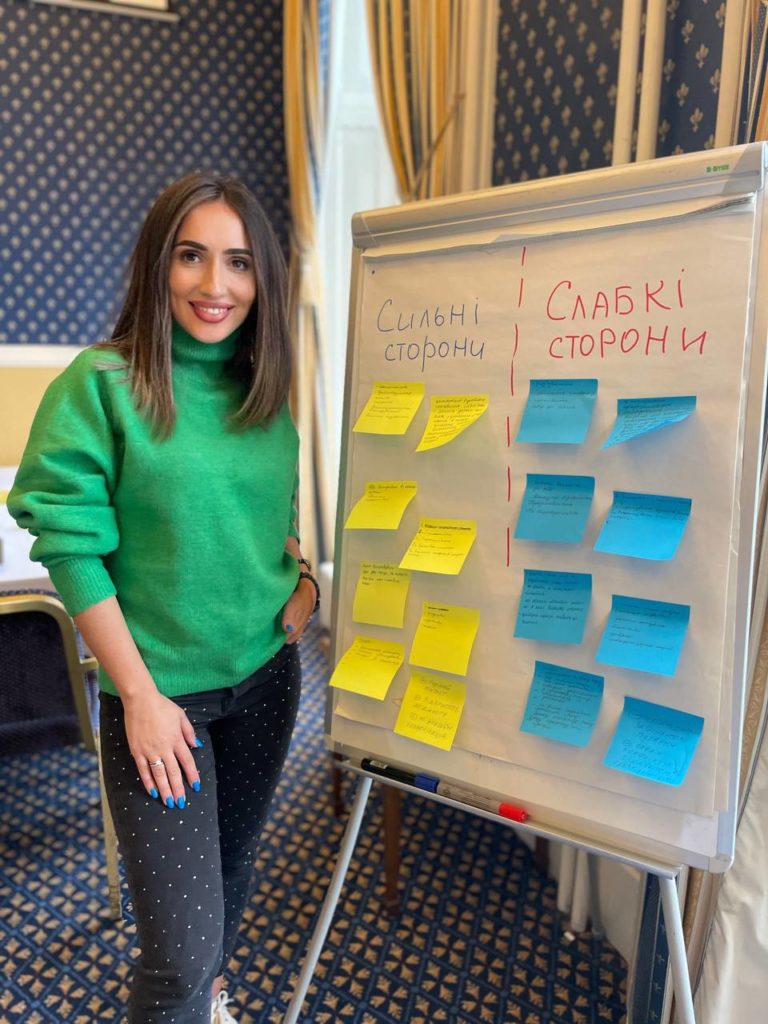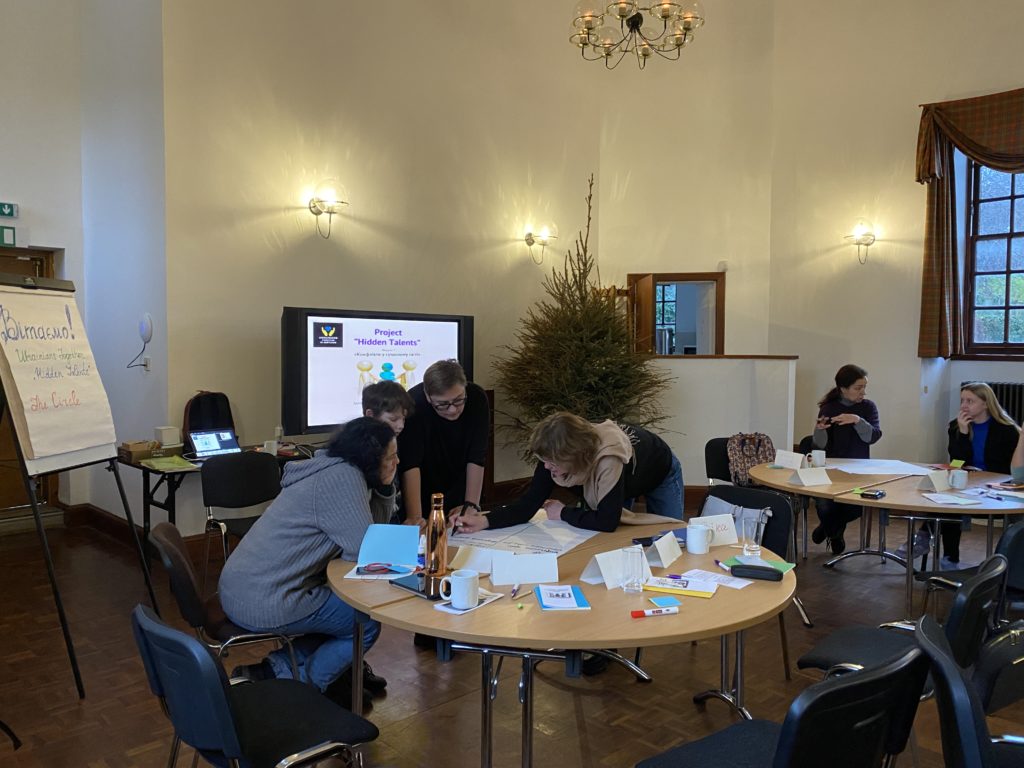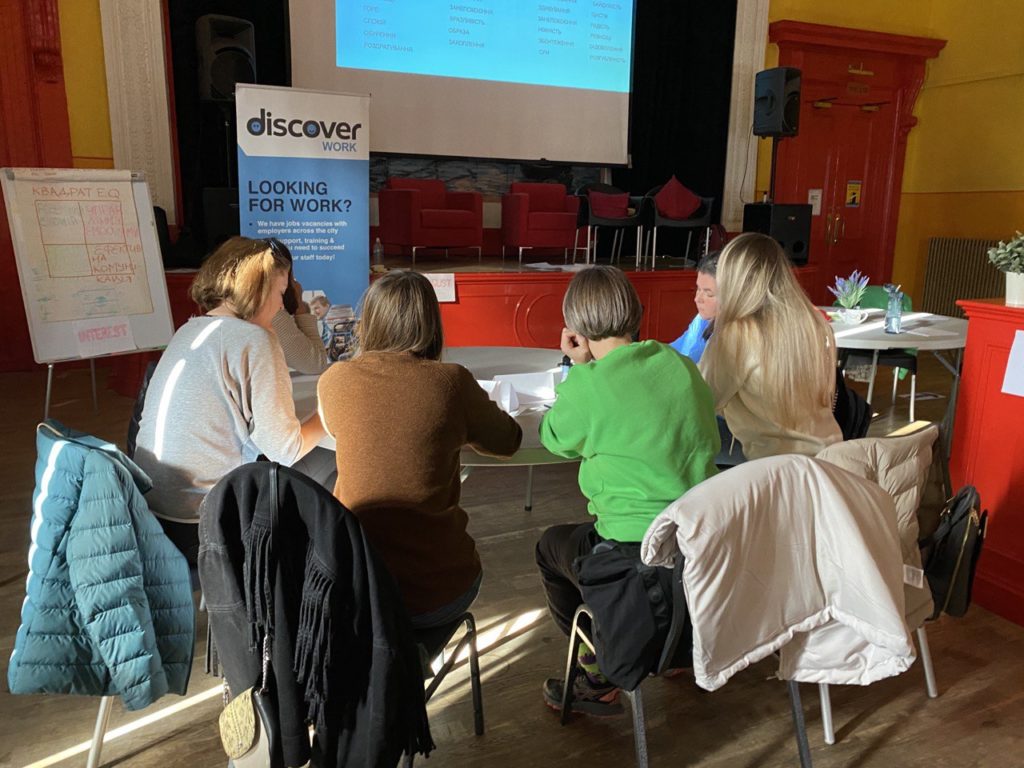When I evacuated, I thought I evacuated because I am weak. I moved because I was afraid. But now I realise that forced migrants are very strong people. Their hearts hurt, but their hearts are strong. It is necessary to be a very strong person to put all of your life in one suitcase and to move anywhere. To start from the bottom, to start in a foreign place, a new community where you know nobody and have to do things from the very beginning.
Hanna Dushkova, speaking on the Visualising War and Peace podcast.
Hanna Dushkova is a Ukrainian lawyer and mediator who has shared her story of living under bombardment in Odesa, after Russia invaded Ukraine in February 2022. As she explains in this podcast episode, she took the hardest decision of her life in March of that year and left behind her home, her life, most of her belongings, and all her future plans, travelling first to Moldova, then to Spain, and then to Scotland as a refugee.
She left because living in a war zone became intolerable. She and her family went to bed every night wondering if bombs would fall on the roof of their apartment building. As well as struggling to sleep, Hanna lost lots of weight through the anxiety. Her professional training helped her to analyse the emotional impact which the constant fear of bombardment and death was having, both on herself and on others. As she puts it: ‘It is impossible to live in this fear, to wait for something to happen… In that period, I felt like I stopped, I didn’t develop, I lived my life on pause.’
Hanna’s discussion of her own experiences helps us to visualise the very difficult decision-making that refugees face: as they try to guess how long the war they are caught up in will last and how close it will come; and as they debate what is the tipping point, when coping with ongoing conflict becomes so hard that packing up a few precious belongings and leaving behind a whole life begins to seem like the only viable option. As they wonder what destinations are open, and how long might they need or be able to stay. As they worry about money, accommodation, and a host of other basic needs, and try to find out what sources of support might be available. And as they ask themselves how can they regain control over their lives again and start to plan for the future. Living life ‘on pause’ is infinitely preferable to dying in a war zone, but it is also extremely draining and difficult to sustain for long.
As Hanna points out, each individual wrestles with these questions according to their own circumstances; there is no rule-book to follow, and no one ‘right’ way. Onlookers observing refugees from afar often make sweeping judgements about what count as ‘valid’ or ‘invalid’ reasons for migration; but the reality is that these are very personal decisions, impacted by a complex range of individual factors. Listening to different people’s stories of forced migration helps us to grasp the diversity of factors that can turn ordinary people into refugees and the very wide range of journeys that they take once they flee. Wanting to regain control over one’s life and make proactive choices about the future is a natural human impulse, and people should not be judged harshly for trying to do just that, especially when their lives have been up-ended by devastating geopolitical events.
All Ukrainians lost something in this war. Grief came to each Ukrainian family. Some lost accommodation, some lost their job, and some lost family members. This of course is the worst thing. We see now the negative effect of war on Ukrainian people – the levels of tension and aggression in their communications, the impacts of trauma on people. With all of this we will have to deal in the future, in five, ten, twenty years.’
Hanna Dushkova, speaking on the Visualising War and Peace podcast.

Amid her own challenges, Hanna has been using her professional skills as a trained mediator to support Ukrainians impacted by conflict – both in Ukraine itself and in communities where increasing numbers of Ukrainians are arriving as refugees. Hanna qualified as a lawyer in 2013, and got her advocate’s licence in 2018. While working to resolve disputes between conflicting parties through the courts, she became interested in mediation – as a constructive and much cheaper alternative to litigation – and in 2019 she qualified as a family mediator with the League of Mediators of Ukraine. Since then she has not only practised as a trained mediator herself but she has also delivered lots of mediation training to others. Among other initiatives, she set up a mediation hub in a local school in Odessa; and she developed a business delivering workshops on communication skills, non-violent conflict resolution, and emotional intelligence, for adults and children. In our podcast conversation Hanna discusses some of the ‘soft skills’ that mediation training helps people develop, such as active listening, emotional awareness and the ability to see disputes from multiple perspectives. She also explains the power of mediation not just to resolve but also to prevent conflicts. These are important skills in peaceful times, but they become even more crucial in times of war.
When Russia launched its full-scale invasion of Ukraine in February 2022, Hanna’s work began to pivot towards crisis mediation, particularly helping to resolve disputes between family members separated by the conflict. As she explains, war brings all sorts of disruption and stress, leading to many more people experiencing family conflicts, financial disputes and personal trauma. Hanna talks us through some of the cases she has dealt with since the war began, helping separated families to work together to find solutions amid the wider conflict of ongoing war.
When she became a refugee herself, Hanna decided to carry on this important work. Now based in Dundee, she and her husband Vitalii Diakov have been developing workshops to support other Ukrainians housed in temporary accommodation alongside them. Through emotional awareness, communication and mediation training, these workshops have been helping refugees to cope with their displacement, develop new workplaces skills, and integrate with the local community. You can read more about Hanna and Vitalii’s work to help Ukrainians deal with the trauma of forced migration and move forward with their lives on their website Ukrainians Together.


Hanna’s commitment and energy not only to building a new life for herself after displacement but also to helping others do the same is inspirational. And it underlines an important truth that Hanna herself articulates at the top of this page: that becoming a forced migrant is not an act of weakness but an act of great strength. As she puts it, ‘It is necessary to be a very strong person to put all of your life in one suitcase and to move anywhere. To start from the bottom, to start in a foreign place, a new community where you know nobody and have to do things from the very beginning.’ Hanna is just one of millions of people all around the world taking on that challenge today.
To hear Hanna’s story in her own words, please listen to this podcast where she discusses her mediation practice as well as her journey of migration from Odesa to Dundee.